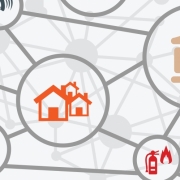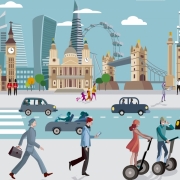Politics is the most vile institution to emerge in our civilization. We don’t even pretend to ourselves that there is anything good in politics. It’s about interest groups fighting over pieces of some kind of communal pie, looking to steal from others, or disadvantage others, or punish others, or otherwise seize resources to which they have no right and which don’t belong to them.
The political way is not to work, not to innovate, not to serve others in the marketplace, but to wait until all that productive activity has taken place and then to grab a piece of it that was neither earned nor deserved. The people who do this – politicians – are rightfully despised. The choice of politics as a field of activity reveals a deep cynicism and a complete moral vacuum.
Politics is about factions in society fighting with each other, demeaning each other, unweaving the fabric of collaboration that is not only the nature of the human condition but the cause of societal progress. War is politics by other means. Politics is war every day.
The individualist has no interest in politics. Its very essence runs contrary to everything that drives the individualist. We individuals wish to pursue our own interests by serving other individuals in the marketplace and earning commensurate commercial, economic and psychic rewards. Politics only gets in the way, restricting us, taxing us and frustrating us.
Happily, the individualist has a solution to the problem of politics. It is a solution that requires us only to act self-interestedly, as we are wont to do.
1) Don’t vote
The politicians justify their scheme on the basis of the processes of democracy. They say we all participate – so we’re all complicit – as a result of voting. They also say that the decision of the majority in selecting so-called representatives provides the excuse for the politicians to pass all the laws, regulations and taxes which so confound individual freedom.
Obviously, the “winning” politicians do not represent a majority of people. Set aside the contradiction that there is no politician who can represent your or my individual views. We need only observe that it is never a majority of the population, and often not even a majority of those who actually cast votes, that is in their favor.
The justification thesis rests, at least, on the fact that quite a large number of those who are “qualified” to vote (what a condescending term that the politicians use!) do actually complete a ballot.
What if we didn’t? Let’s not vote. Let’s never vote again for any politician. Let’s not give them the grounds for the justification of their scheme.
Even if some vote, and most of us don’t, then the justification will become thinner and thinner and harder to sustain.
In Australia, the politicians have made it mandatory to vote. There is a fine if you don’t. That certainly betrays the fear of the politicians that the scheme is becoming threadbare and harder to sustain. Here in the U.S. too, politicians will undoubtedly seek ways to force you to participate, or to appear to be participating. Let’s resist. Let’s refuse. It’s a simple thing. But it could be profound in it implications.
2) Don’t talk about politics or politicians
The politicians have adopted the techniques of marketing and have become pretty good practitioners. They know how to get attention; and they think they can “sell” their laws and regulations and taxes and fines to their vested interests by using the language of benefits.
They have direct access to all the channels of marketing communications. They are interviewed in Congress and in their constituencies and in the offices of their bureaucracies and in TV stations and newspaper offices. They run advertisements during election periods, using the tools of the free market to undermine the free market.
They have also developed an army of talking heads who, in TV shows, podcasts, web videos and newspaper columns, make politics a subject of popular entertainment by talking, talking, talking.
We, in turn, talk about the talking. We talk about it in our Facebook conversation and on Snapchat and Instagram and Twitter. We talk about it over lunch and dinner and drinks with friends and around the water cooler in our offices. We give them credibility because the more they talk, the more we talk. They’ve politicized everything, and we let them do it.
Let’s stop. Let’s talk about the economy and sports and film stars and sportsmen and women and business and innovation and economic theory and fashion and gardening and vacations and cars and romance. Let’s give the politicians no echo chamber, and no popular dialogue. Let’s make them a monologue. Let them talk to themselves. We’ll talk about something else.
3) Be your own editor
One way to make progress towards the goal of excluding politicians from your life is to be your own editor. It used to be the case that you could let an intermediary sort through the news and commentary for you, organize it, and present it for your consumption. In the past, you may have given permission for network TV to do this for you, or a daily newspaper, or an aggregation website, or a magazine. No longer! They all have biases, and the information they present is filtered through those biases. Often, they are trying to get you to over-react, by placing more emphasis than is merited on some “hot” news item and inflating its supposed importance.
Pick your own sources of news and information. Sometimes, these may be publications or websites, and sometimes just individual writers and bloggers. Pick your subjects – maybe you can curate a set of news providers and commentators on economics or technology or business or sports who don’t stray into politics. Pick your writers. By all means pick them from multiple sides and perspectives, in the knowledge that all are biased.
Be firm in your own opinions and beliefs. Challenge yourself every day. But don’t let the politicians and their echo chamber mislead you.
4) Don’t be fooled into believing in collective goals
Politicians like to talk about “the national interest” or “social goals”, or lower order collective concepts such as “the labor market” or “the middle class”. Don’t be fooled. Only individuals enter into economic exchanges and so only the values and interests of individuals matter; in fact, these are the only values that exist. There are no social values, and no national interest. Individuals may share values in common, and may even agree on policy directions. But they do so only for furthering individual interests. These interests are not collective, and we can safely ignore politicians whose preaching suggests that there are superhuman interests that individuals should be enticed to follow.
Adam Smith established for us the principle that, if we each pursue pour own individual interests as we see them, guided by our own individual morality, great results will emerge for all individuals who participate in the community. Set your own goals and pursue them with confidence and energy and do not let politicians impose constraints. Assert your individual independence with pride.
5) Be an entrepreneur and help to fix other people’s problems.
One of the justifications politicians invoke for their laws and regulations and taxes and fines is that they are aimed at solving social problems. We know there is no such thing as a “social problem” because there is no such thing as society. There are just individuals. So they are claiming that they can solve the problems of individuals.
In fact, the only way to achieve such a goal is through entrepreneurship. The entrepreneur is an individual who identifies the problems that people want solved, and develops a solution that he or she can offer for sale. If people buy, they’re indicating that the offering does, indeed, solve their problem. If the entrepreneur makes a profit – the sale price is higher than the entrepreneur’s costs – it’s a signal that the solution is highly valued.
This is the way the market works to solve problems. Becoming an entrepreneur will give you the immense satisfaction of participating in this process, perhaps even leading it in your domain or your locality. By solving problems, you will make a genuine contribution to progress, innovation, and quality of life – something politicians will never do.













